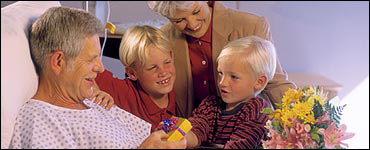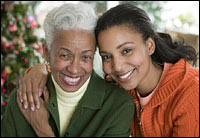CDC Features
Current Features
Health Tips for Visiting Nursing Homes and Hospitals

The holidays traditionally bring family and friends together for visits, and residents of nursing homes and patients in hospitals especially appreciate seeing friendly, loving faces. If someone you know is under such care, we hope you'll have a chance to see them: their holidays and their spirits will shine brighter.
Be aware, however, that people staying in these facilities may more easily catch illnesses that you bring with you on your visit. So, keep everyone safe and healthy by following these simple tips:
• If you have a cold or the flu, stay home. Nursing home residents and hospital patients can be at higher risk for infection. Therefore, if you aren't feeling well, a phone call is a better way to let them know you care; if possible, you can set up a later time to visit when you are well.
• Clean your hands. Many types of illness, from the common cold to more serious infections like Clostridium difficile and VRE (vancomycin-resistant enterococci), are spread when people fail to wash their hands properly. When you visit a nursing home or hospital, wash your hands with soap and water for at least 15-20 seconds or use an alcohol-based hand rub (or sanitizer) before hugging or touching the people you are visiting, and especially after using the restroom and before eating. Make sure your children wash their hands as well. Some rooms are equipped with alcohol-based hand sanitizer dispensers, too; look for them near the door or bathroom. If your loved one must follow doctor-ordered special germ-prevention rules (such as what are called Contact Precautions), follow instructions from the nursing staff and clean your hands when leaving.
• Check visiting hours, and consider calling ahead to plan your visit. Not only will you ensure that you'll have enough time to visit with your loved one without interfering with meals or other activities, but you will also give them time to anticipate and look forward to your visit.
• If you are planning to see someone in specialized care, call ahead to make sure you understand their visiting hours and regulations: they may differ from those in the rest of the facility.
• Children bring a special kind of cheer to nursing homes and hospitals, so certainly bring them along – but do check with the facility to make sure children are allowed and under what conditions. You may want to prepare them before the visit by explaining what they might see and answering any questions they may have. If your child is sick, leave him or her with other relatives or friends while you visit.
Holiday visitors can raise the spirits of nursing home residents and hospital patients, and these tips will help everyone enjoy safe and healthy visits.
For More Information
Page last updated: December 24, 2007
Content source: Division of Healthcare Quality Promotion, National Center for Preparedness, Detection, and Control of Infectious Diseases
Content owner: National Center for Health Marketing
URL for this page: www.cdc.gov/Features/HolidayVisits/
*Links to non-federal organizations are provided solely as a service to our users. These links do not constitute an endorsement of these organizations or their programs by CDC or the federal government, and none should be inferred. CDC is not responsible for the content of the individual organization Web pages found at these links



